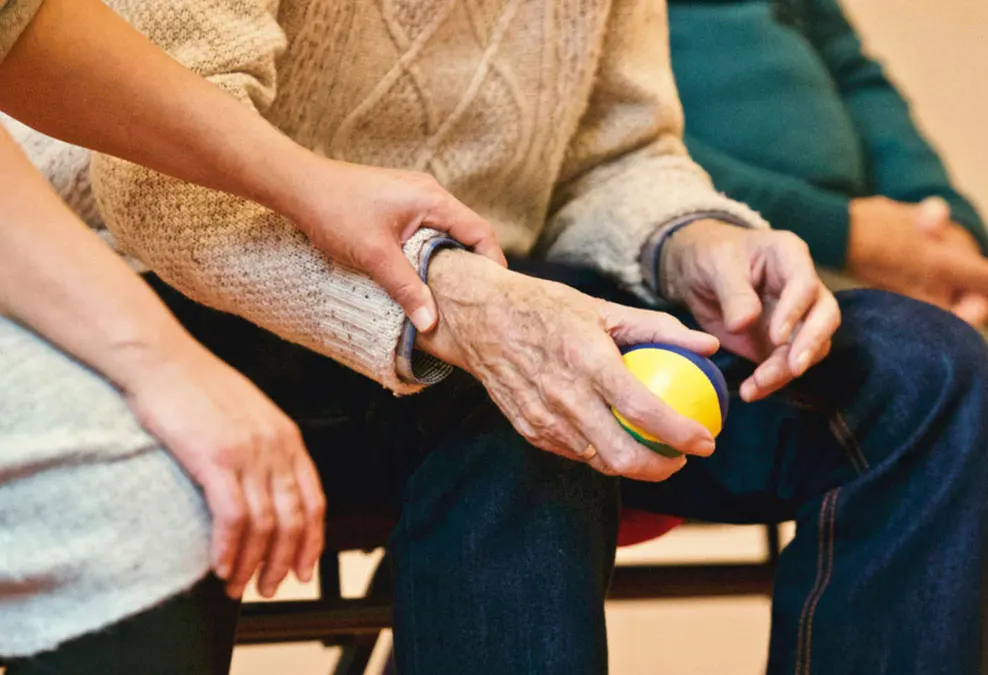1. Communication.
It is very important to speak to the affected person slowly, clearly, without raising your voice. If they do not understand initially, it is necessary to repeat the information more frequently and without nervousness. It is recommended to repeat everything that has been said before. A longer and more complex conversation must be understood gradually, thought by thought. Non-verbal communication is very important - a smile, gestures, or holding hands. This reflects our relationship and attitude towards the patient, who feels comfortable in our presence. Communication is also facilitated by watching the speaker's mouth. It is beneficial to involve them in conversations with family members or friends.
2. Nutrition.
It should be balanced. It contains all essential components: proteins, fats, sugars, fiber, vitamins, minerals, and sufficient fluids (at least one liter per day).
Studies show that a rich diet, primarily based on fruits, vegetables, lean proteins (fish, chicken, and turkey), low-fat yogurts and cheeses, whole grain bread, nuts, and seeds, is beneficial to health. It is necessary to avoid red meat and processed products.
Foods that are high in healthy fats are beneficial even in the case of Alzheimer's disease. These include olive oil, avocado, nuts, certain seeds, and some types of fish. It is important to avoid processed foods and ready meals. There are scientific studies indicating that substances called ketones, produced when there is a lack of carbohydrates to burn, may have a protective effect on brain cells. It is crucial to inform the patient about the daily meal being served so they can make an appropriate choice from the options. It is advisable to bring only one course and offer the next only after it has been eaten. Do not give the patient excessive choices. The awareness that they have to choose can disorient them.
3. Dressing.
If the patient is still able to dress themselves, it is advisable to stay nearby - assistance may be needed in selecting certain pieces of clothing to wear. It is recommended to sort through a wardrobe full of clothes. Too many items can unnecessarily confuse the affected person and make selection difficult. If they cannot choose suitable clothing on their own, help them prepare the individual pieces in the order they are to be worn, such as underwear, dress, shoes.
4. Incontinence.
Patients with dementia often experience urinary incontinence before reaching the toilet. Therefore, they must have access to chamber pots and easily removable clothing (such as Velcro fasteners). In moments of anxiety, they may not be able to find their way to the toilet. Distinctive, colorful, and easily recognizable signs (better than written labels) can assist them.
For permanent incontinence, it is necessary to accompany the patient to the toilet regularly every 2 - 3 hours, especially in the morning, before bedtime, and once during the night. The use of a chamber pot and limiting fluid intake in the evening can be helpful.
6. Disorientation.
It is very effective to remind the affected person of basic facts right after waking up. For example: "Good morning. I am Maria, your wife. Today is Tuesday. It's a beautiful sunny day." If they insist otherwise, do not contradict them. Redirect their attention to another topic and try to repeat the correct information later. Correct their beliefs very sensitively. Contradiction and reprimanding will only increase their confusion. If they keep asking the same thing, respond very patiently. Realize that they truly forgot the answer or do not remember asking the question.
7. Depression.
It is important to adjust the daily schedule for the affected person so that they can always engage in something interesting (listening to music, playing cards, gardening, going for walks). Routine activities such as dusting, cleaning cutlery, and washing dishes also help, even if we might have to repeat them after the patient.
8. Aggression and Restlessness.
The first therapeutic step is a tactful and discreet attempt to bring the patient back to reality. Any contradiction, however, can irritate them. Assistance involves alleviating fears. Do not let them watch television, cover mirrors, and remove disturbing images. In the later stages of the disease, the patient may even be frightened by their own reflection in the mirror.
By following the above-mentioned advice on how to work with a patient with Alzheimer's disease, there can be a significant improvement in their quality of life and health condition.
Used sources:
www.orin.sk
www.alzheimer.sk
www.pluska.sk
